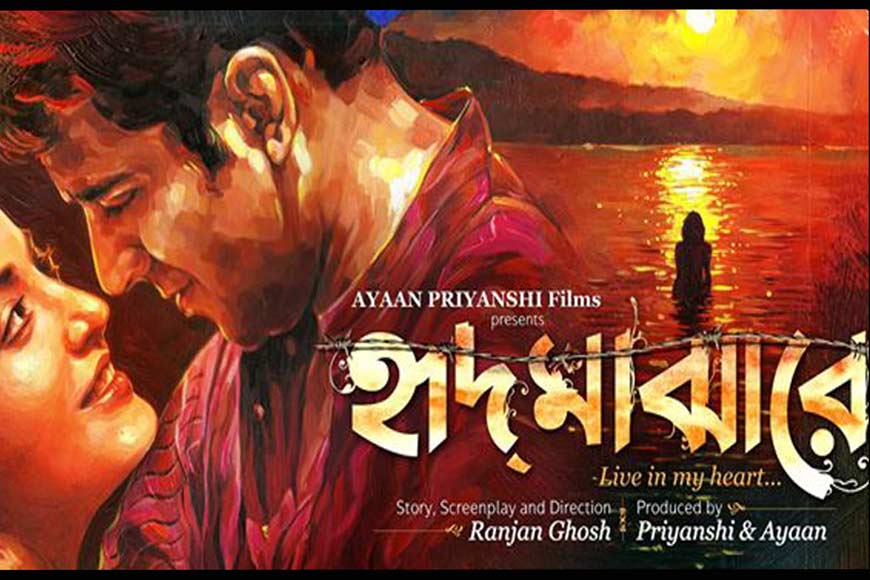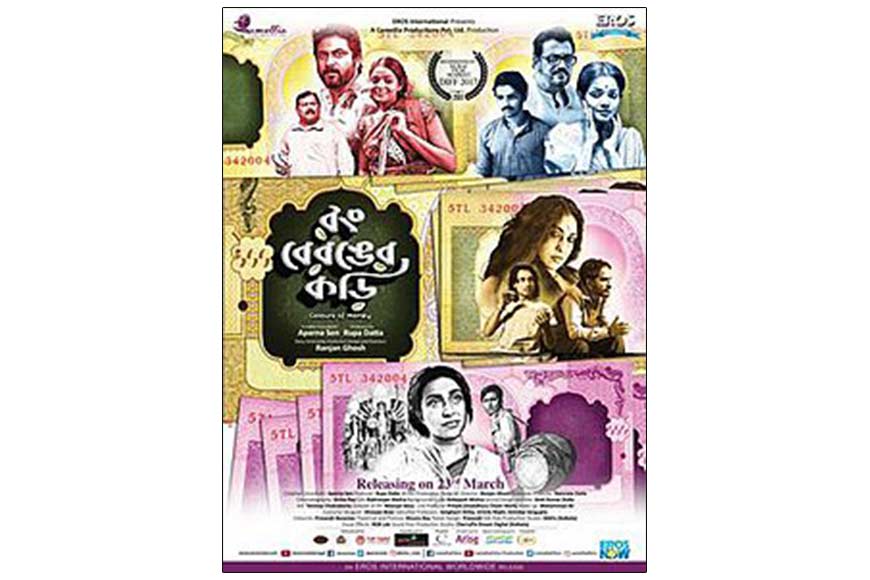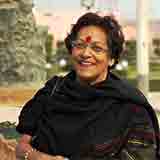Mahishasura Mardini and the multi-layered world of Ranjan Ghosh

Ranjan Ghosh’s debut film Hrid Majharey (2014) created waves in various quarters as one of the best adaptations of William Shakespeare’s Othello, never mind the disastrous box-office response to it in his home state. While the reaction was amazing in academic circles beyond Indian shores, Hrid Majharey scored a first at home when it featured in a project titled ‘Shakespeare in Bengal’, organized by the Jadavpur University English Department (JUDE). This paved the way for the film’s inclusion in the UGC Literature Archive.
 Ranjan Ghosh
Ranjan Ghosh
Many scholars feel Hrid Majharey marked a new beginning for Bengali cinema by placing Bengal on an international platform as far as a cinematic connection with the Bard goes. In 2015, Hrid Majharey was part of a PhD thesis titled ‘Shakespeare and Indian Cinema’ at New York University’s Tisch School of Arts. The faculty felt that Hrid Majharey broke away from any colonial implications linked to Bengal’s British past, and had an entirely independent and topical feel. In 2014 itself, it had earned a recommendation from Film London in its list of world cinema based on Shakespearean plays. And in 2013, it created history of a different kind by becoming the first Bengali film to be shot in the Andaman and Nicobar Islands after Tapan Sinha’s ‘Sabuj Dwiper Raja’ in 1979.
Ghosh honed his film-writing skills at Whistling Woods in Mumbai, and after Hrid Majharey made Rongberonger Korhi (Colour of Money), an anthology of four short stories, each focusing on a single emotion. “Each story deals with human relationships and money.
Nearly seven years later, the 38-year-old filmmaker and former mariner is working on his fourth feature film, intriguingly titled Mahishasura Mardini, and is just back after shooting a major portion entirely on location in Chinsurah. The film operates within a limited but challenging time span of a single day, and does not have a protagonist in the commonly understood sense of the term. The focus is on three major characters played by Saswata Chatterjee, Parambrata Chatterjee and Rituparna Sengupta.
Ghosh honed his film-writing skills at Whistling Woods in Mumbai, and after Hrid Majharey made Rongberonger Korhi (Colour of Money), an anthology of four short stories, each focusing on a single emotion. “Each story deals with human relationships and money. The four emotions are love, separation, profit, and loss. I had been toying with the concept of money and how it assumes different roles for different people. A crude example: a king, a pauper, a saint and a thief, all relate differently to the same entity called ‘money’. Such ruminations led to these four short stories,” says the young filmmaker.
The film faced some problems with the Central Board of Film Certification but was later certified without a single cut, garnering positive reviews for its unique interpretation of what happens to people who are differently influenced by money.
Since he claims never to repeat himself, and given the great success of Aha Re, finding a different subject must have been a challenge. Says Ghosh, “With Mahishasura Mardini, I am trying to break into new territory. The challenge is essentially not to repeat myself, to keep exploring newer subjects.
Ghosh’s third film Ahaa Re (2019) is still being noticed, screened, written about and awarded at different film festivals. In this unique film, Ghosh decided to make food, or the culinary arts, his subject. The perspective is completely different as food and cooking in this film function as an ideology, a philosophy, a bonding factor between people otherwise dissimilar and most importantly, as a way of life. Food and cooking as a means of communication is underscored again and again. This adds a lot of colour and variety to a film that might have seemed dull, but is not.
Since he claims never to repeat himself, and given the great success of Aha Re, finding a different subject must have been a challenge. Says Ghosh, “With Mahishasura Mardini, I am trying to break into new territory. The challenge is essentially not to repeat myself, to keep exploring newer subjects. Ahaa Re has been received really well, but that has not placed any additional burden of expectation on me. I don’t think like that, my thinking is not like that... Presently I am concentrating on realising, to the maximum potential, my vision of Mahishasura Mardini.”
 Poster of Rongberonger Korhi
Poster of Rongberonger Korhi
About the basic premise of the new film, Ghosh adds, “Mahishasura Mardini is our letter of apology to a woman. Through this film, we want to express our grief and say ‘sorry’ for all the wrongs that keep getting done to her, right from the stage she is conceived in the womb till the time she breathes her last. These wrongs happen at various levels and are committed not only by men but also by women. There are both social and political connotations in these wrongdoings that are evil manifestations of the demons within us born out of the patriarchal construct of our society.”
What drove him to coin a title that might raise controversies in the present political ambience? Ghosh’s explanation is lucid and uncompromising. “The title came organically to me because it is essential to the storyline. It has nothing to do with marketing strategy. I don’t operate like that. I follow my heart and go with decisions that come naturally to me. Both in my personal and professional lives. The selection of Mahishasura Mardini as the title is one example. When you watch the film, you’ll know the effectiveness of the title. The only thing I can say is that it is a multi-layered concept and the title does justice to it.”
Saswata, Parambrata and Rituparna are joined by able theatre actor-director Koushik Kar, along with actors Sritama Dey and Arunima Halder. Three new faces from theatre - Aryuun Ghosh, Purbasha Mal and Abhyuday Dey - hold their own against the stalwarts. Shubhro S Das (who debuted in Ahaa Re) and Aritraa Sengupta play the younger versions of Saswata and Rituparna. They are “stunning”, says the director. Two other important characters are played by Shaheb Bhattacharjee and Poulomi Das. Ghosh is preparing to shoot the second and final schedule soon, followed by post-production back in Kolkata.
Deeply influenced by Bengali writers like Bankim Chandra Chattopadhyay, Sarat Chandra Chattopadhyay, Manik Bandopadhyay, Narendranath Mitra, Sunil Gangopadhyay and Bibhutibhushan Bandopadhyay, Ghosh also counts W.S. Porter, Chopin, Guy de Maupassant, and Anton Chekov among his influences.
About the basic premise of the new film, Ghosh adds, “Mahishasura Mardini is our letter of apology to a woman. Through this film, we want to express our grief and say ‘sorry’ for all the wrongs that keep getting done to her, right from the stage she is conceived in the womb till the time she breathes her last. These wrongs happen at various levels and are committed not only by men but also by women.
As we sign off, he says, “Cinema is my only religion and the only God I know. My producers have put in quite a bit of money and have taken a risk to support this film, which is completely off the beaten track. If the audience supports us, we will be encouraged to create more such films in future.”
About the basic premise of the new film, Ghosh adds, “Mahishasura Mardini is our letter of apology to a woman. Through this film, we want to express our grief and say ‘sorry’ for all the wrongs that keep getting done to her, right from the stage she is conceived in the womb till the time she breathes her last. These wrongs happen at various levels and are committed not only by men but also by women. There are both social and political connotations in these wrongdoings that are evil manifestations of the demons within us born out of the patriarchal construct of our society.”
 Poster of Aha Re
Poster of Aha Re
What drove him to coin a title that might raise controversies in the present political ambience? Ghosh’s explanation is lucid and uncompromising. “The title came organically to me because it is essential to the storyline. It has nothing to do with marketing strategy. I don’t operate like that. I follow my heart and go with decisions that come naturally to me. Both in my personal and professional lives. The selection of Mahishasura Mardini as the title is one example. When you watch the film, you’ll know the effectiveness of the title. The only thing I can say is that it is a multi-layered concept and the title does justice to it.”
Saswata, Parambrata and Rituparna are joined by able theatre actor-director Koushik Kar, along with actors Sritama Dey and Arunima Halder. Three new faces from theatre - Aryuun Ghosh, Purbasha Mal and Abhyuday Dey - hold their own against the stalwarts. Shubhro S Das (who debuted in Ahaa Re) and Aritraa Sengupta play the younger versions of Saswata and Rituparna. They are “stunning”, says the director. Two other important characters are played by Shaheb Bhattacharjee and Poulomi Das. Ghosh is preparing to shoot the second and final schedule soon, followed by post-production back in Kolkata.
What drove him to coin a title that might raise controversies in the present political ambience? Ghosh’s explanation is lucid and uncompromising. “The title came organically to me because it is essential to the storyline. It has nothing to do with marketing strategy. I don’t operate like that. I follow my heart and go with decisions that come naturally to me. Both in my personal and professional lives.
Deeply influenced by Bengali writers like Bankim Chandra Chattopadhyay, Sarat Chandra Chattopadhyay, Manik Bandopadhyay, Narendranath Mitra, Sunil Gangopadhyay and Bibhutibhushan Bandopadhyay, Ghosh also counts W.S. Porter, Chopin, Guy de Maupassant, and Anton Chekov among his influences.
As we sign off, he says, “Cinema is my only religion and the only God I know. My producers have put in quite a bit of money and have taken a risk to support this film, which is completely off the beaten track. If the audience supports us, we will be encouraged to create more such films in future.”











